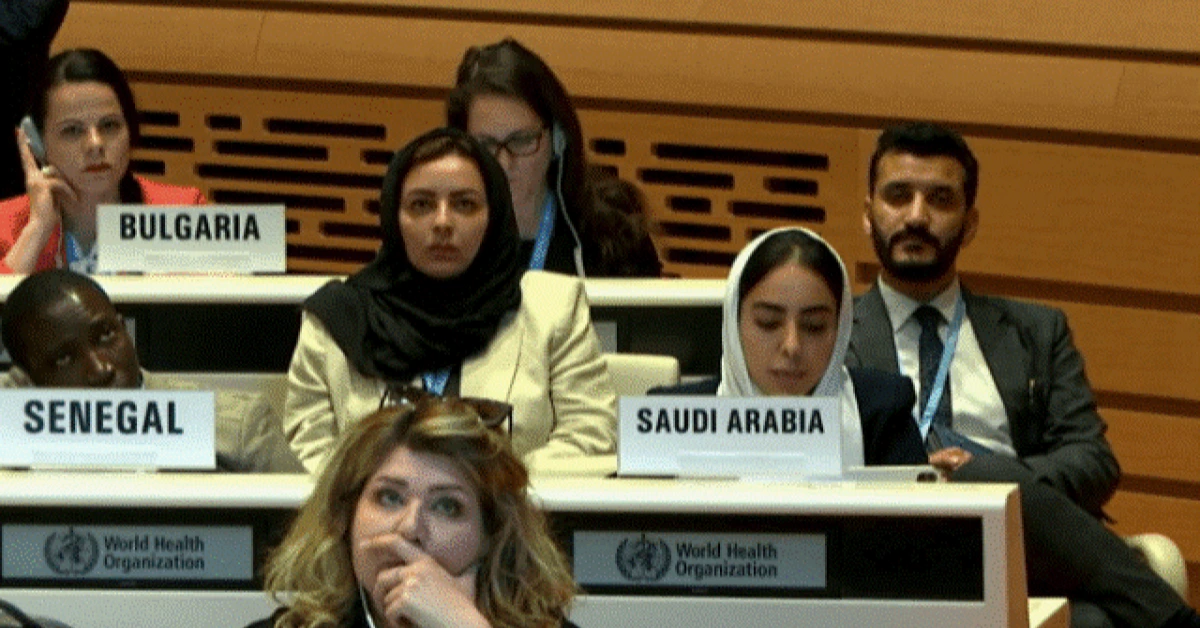
SWITZERLAND – The World Health Assembly has officially approved a landmark WHO Climate Change and Health Action Plan, overcoming strong opposition led by Saudi Arabia and other oil-producing nations.
The decision followed intense procedural wrangling that stretched into Tuesday evening, with countries ultimately voting 109-0 in favor of the plan. Nineteen abstained, but none voted against it.
Earlier in the day, the Assembly firmly rejected a Saudi-led motion to postpone the plan for another year, voting 86-23 against the delay.
The push to stall came from several member states in WHO’s Eastern Mediterranean Region (EMRO) –including Saudi Arabia, Iran, Iraq, Libya, and others – with Russia also backing the move.
Despite these efforts, the final vote proceeded after hours of procedural tactics, including last-minute amendments and debates aimed at derailing the process.
Egypt’s attempt to introduce an eleventh-hour amendment “in the spirit of consensus” triggered another procedural vote, which Peru blocked to close the debate.
As frustration mounted and exhaustion set in, WHO Legal Counsel Derek Walton quipped, “We’re really testing the rules of procedure today.”
Eventually, supporters held their ground, refusing to walk out as the opposition had hoped. When EMRO nations could no longer delay, Egypt voiced final objections on behalf of the bloc, forcing a definitive ballot that passed overwhelmingly.
Saudi Arabia and its allies claimed the plan lacked adequate consultation and didn’t reflect diverse national contexts.
Saudi delegates also argued that developing countries, particularly those with low historical emissions, shouldn’t bear the burden of transitioning to clean energy.
However, critics highlighted the deeper motives: Saudi Aramco, the world’s largest oil company, has the most aggressive fossil fuel expansion plans globally, directly conflicting with the WHO’s push for renewable energy in healthcare systems.
The WHO’s advocacy to power health facilities with clean energy, reduce emissions through sustainable transport, and promote healthier urban design directly challenges the interests of oil-producing nations. Yet it resonates deeply with many low-income countries.
Mozambique, speaking on behalf of the 47 African WHO member states, emphasized Africa’s vulnerability to climate-related impacts.
“Our continent contributes minimally to emissions but bears the greatest burden,” the delegate said. The African group backed the plan in full, calling for urgent action to build climate-resilient health systems.
This is more than a policy victory – it’s a lifeline. Roughly half of health centers in Sub-Saharan Africa lack reliable electricity, with 12–15% having none at all.
These gaps compromise emergency services, maternal care, and vaccine storage. Globally, one billion people rely on health facilities with no or unreliable power.
WHO, through its ATACH initiative, has been helping countries transition to low-carbon, climate-resilient health systems.
It works with partners like the International Renewable Energy Agency (IRENA) and philanthropic organizations to finance decentralized renewable energy solutions, especially mini-grids, seen as the most viable option for powering rural clinics.
At the same time, Africa is positioning itself to lead a renewable revolution. A US $40 billion African Energy Fund launched in February aims to connect 300 million people through green energy.
However, the recent collapse of USAID’s Power Africa program and shifting U.S. policy under the Trump Administration threaten these efforts.
While the U.S. did not participate in this year’s Assembly, observers noted it would likely have supported Saudi and Russian efforts to delay the plan.
In contrast, Europe and other high-income nations advocated for a more ambitious climate-health agenda, focusing on low-carbon development alongside adaptation.
Poland, speaking on behalf of 34 nations, including EU members, emphasized the need for the WHO to support healthier urban design, sustainable transportation, and cleaner diets – strategies that benefit both people and the planet.
“We must position health as a driver of climate ambition,” said Poland’s delegate. “This means educating communities and engaging other sectors – from mobility to food systems.”
XRP HEALTHCARE L.L.C | License Number: 2312867.01 | Dubai | © Copyright 2025 | All Rights Reserved